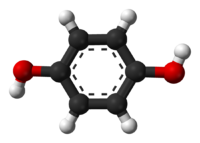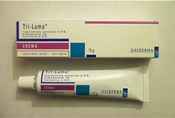Hydroquinone Side Effects
It is only natural that along with all the hype, consumers are curious about hydroquinone side effects.
The Internet is notorious for spreading rumor and feeding paranoia. On the other hand, today consumers are empowered as never before as online information can be obtained fast and free.
The real problem is knowing who to trust. We have used only authoritative sources such as professional dermatologists and other experts in order to bring you the facts.

In 2001 hydroquinone was banned as an ingredient in cosmetics after it was shown to cause leukemia in mice and other animals. However, it has not yet been proven that it cause cancer in humans. Despite the lack of conclusive evidence, the FDA is concerned and has considered banning all over the counter sales of hydroquinone cream.
So back to hydroquinone side effects . . .
First, the good news. This stuff works! Both of our fave experts, dermatologist Dr Jeffrey Dover, and industry maverick Paula Begoun suggest hydroquinone as the first line treatment for a light, even skin tone.
Dr Jeffrey dismisses the European cancer scare as based on "circumstantial evidence", and the consensus from professional associations of dermatologists is that "Hydroquinone cream is very well tolerated."
DermNet NZ advises as follows on the side effects of hydroquinone: "Some women may experience minor and temporary skin irritations including mild itching or stinging and reddening of the skin (irritant contact dermatitis). If these do not subside stop using the cream.
Side effects that should warrant stopping the cream and seeking medical advice immediately include severe burning, itching, crusting, or swelling of treated areas (possible allergic contact dermatitis) and any unusual skin discolouration.
Prolonged use of hydroquinone has been associated with the development of exogenous ochronosis (a persistent blue-black pigmentation), especially in Africa, but this is rare. It might be due to other ingredients such as phenol, resorcinol and antimalarial agents, which are known to cause ochronosis.
Precautions: Do not use benzoyl peroxide, hydrogen peroxide, or other peroxide products when using hydroquinone. A temporary dark staining of the skin may occur. If accidentally used together, wash the skin with soap and water to remove the staining.
Hydroquinone creams may contain sodium metabisulphite that may cause serious allergic reactions (including anaphylaxis) in certain susceptible people.
Hydroquinone should not be used in pregnancy or when breastfeeding."
Hydroquinone 4

At the moment, the US allows over the counter sales of 2% hydroquinone cream, but 4% hydroquinone cream requires a prescription.
This is why there are so many references to "Hydroquinone 4". Not only is 4% (i.e. hydroquinone 4) the magic concentration for triggering a prescription, it is also, according to some experts, the most effective concentration.
Why use hydroquinone cream?

Hydroquinone cream has become a very popular skin treatment as it lightens the complexion and evens out discolorations. In particular, it is great for treating a condition known as melasma - a disfiguring condition of brown patches on the skin. This is sometimes called as hyper-pigmentation because that is kind of what is happening - a proportion of the sufferer's pigment-producing cells are working overtime.
It is commonly referred to as a "skin lightener" but this can be misleading in that it does not "bleach" the skin. Rather, it inhibits the production of pigmentation.

Skin discolorations may occur for many reasons. Some people just have uneven pigmentation. For other women, these dark spots or brown spots appear due to pregnancy, skin trauma, the use of birth control pills, or hormone replacement therapy.
Some women simply want to treat age spots, sun damage or simple freckles.
Personally, I believe that hydroquinone is safe and effective. However, I also understand there is mounting concern about hydroquinone side effects. Some women are simply allergic - this is not the same as saying hydroquinone is inherently unsafe. It is like banning peanut butter sales because some folks are allergic to peanuts!
Return from Hydroquinone Side Effects to Does Obagi Work?
Return from Hydroquinone Side Effects to Home
New! Comments
Please, leave a comment in the box below.




